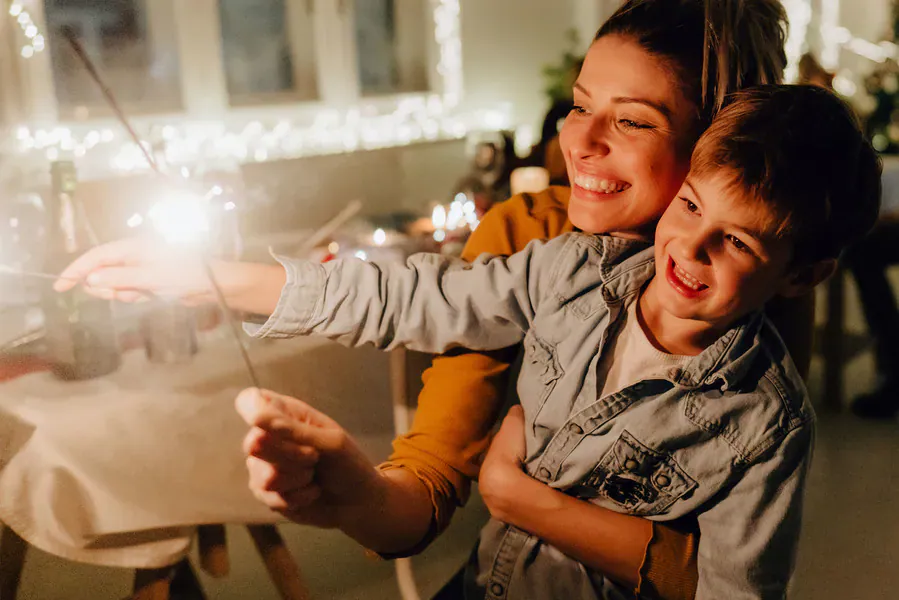Stability is good for kids – especially right now

Feeling secure is good for kids. When children can count on family life to have routines, it helps create a sense of security. Even the word ‘familiar’ makes us think of family routines that are well-known and understood. They set the groundwork for healthy development.
But of course, not every day will be exactly the same. Things sometimes change. And also, there’ll be special occasions. At this time of year, children and teenagers look forward to family gatherings, sweet and tasty treats, and gifts. Special memories, pretty lights, and playing and laughing with cousins may be all part of the magic.
But what about when those special occasions aren’t going to be quite the same? Whether it’s because of financial strain due to COVID-19, travel plans having to change, relatives being unable to visit, or some other reason, sometimes even long-awaited special events will be different to what was originally planned, this year especially.
SUPPORTING WELLBEING BY HELPING KIDS FEEL SECURE
A child or teenager dealing with changes they don’t expect may find it unsettling. They may feel anxious or sad. They may even be angry or disruptive. They may not understand why adults are acting differently, such as speaking harshly because they are stressed. Children may wonder if it’s their fault. If this continues, life can start to seem unpredictable. A sense of uncertainty can creep in.
No matter what else changes, the ultimate sense of security for children is based on knowing they are loved and valued. Showing this through words and actions is more important than ever right now.
Keeping to normal life and routines as much as possible helps children and teenagers feel like even though some things may change, not everything will. It’s a bit like being able to grab onto a handrail when a bus or train starts moving – having that fixed support helps maintain balance, should things take an unexpected turn.
EMOTIONAL WELLBEING IS SUPPORTED BY SIMPLE FAMILY TRADITIONS
At this time of year, your family’s unique traditions and small ‘rituals’ help continue the feeling that everything is reasonably normal. It’s not about spending money. Some of these you may already have, and some you can create. You may have your own religious or cultural traditions. You may like certain music, or movies. Maybe you have certain favourite sayings that everyone chimes in on. Some like to go for a weekly or daily walk. Some have a talent night or ‘what I like about you’ jar, where a note is placed every day and read aloud each month.
Talking and laughing together also builds social skills. Another way to create time for this is by doing cooking or craft together, even if it doesn’t turn out exactly like the pictures said it would!
All this is important because positive interactions remind children that they’re in a safe, loving family environment. It’s just one example of how parents and carers have the power to help support children’s and teenagers’ physical, emotional, social, and behavioural development. The ability to manage emotions, cope with changes, and get along with others are all part of healthy brain development. These can all be encouraged by positive parenting.
CONFIDENCE TO COPE WITH CHANGES
Even though routines and traditions matter, understanding how to adapt and be flexible is also important. Things may be a bit different this year. Children can cope better with changes when they know ahead of time what will be different and when the focus is on what’s going to stay the same. When older children and teenagers feel more like they have some say in what’s happening, this helps them to feel less stressed and improves their coping skills. This can be supported by involving them, if possible, in constructive, problem-solving discussions about how to manage changes.
USING YOUR KNOWLEDGE
When you understand more about child development and behaviour, you can use positive parenting within your own family. You can do this in a way that will work best for you. It works at any time of year, not just right now.
Positive skills and ideas like these make it easier to cope with change and uncertainty. They also help you feel confident you’re supporting your child. You’re also taking important steps to promote their resilience and emotional wellbeing.
To learn more about child development and how you, as a parent, can use positive parenting skills and strategies to support it, try a Triple P program such as Triple P Online.

